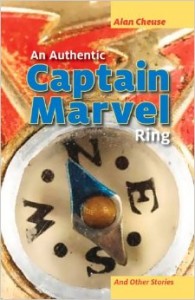 In the first issue of SR I published a brief bit of prose which I saw as a sketch of some sort though it could easily have passed for a prose poem (the editors decided on the latter). I include it here in its entirety, centering as it does on a single object from my past:
In the first issue of SR I published a brief bit of prose which I saw as a sketch of some sort though it could easily have passed for a prose poem (the editors decided on the latter). I include it here in its entirety, centering as it does on a single object from my past:
“An Authentic Captain Marvel Ring, Perth Amboy, New Jersey, C.1947”
Jagged reddish-orange lightning-shaped scores, a circle with compass arrow and points east west north south within, and in the center of the circle, an oval, an opening invisible unless you held it directly up to your eye, an opening—
Peep inside, that is, press it in a dark room to one eye while the other you keep closed tight, and as soon as you become accustomed to the dark you’ll begin to see light swirling within the ring, halos and rings of glittering pieces of light, particles of atoms, of atoms growing smaller and smaller in the depths of the once tiny but now ever-expanding space, a peek into another space, into a seemingly infinite galaxy of galaxies, dancing, spinning, sparkling, exploding now! oh, that flash of fire in the distance! but where? but how? how far away? a fingertip and an infinity!
And what if this could be real? And what if there were stars in all those flashing rings of light, stars with planets and planets with creatures living upon them? what if there were other human beings living there? what if, what if you looked long enough and hard enough, squinted at this peep-hole all night long until you might see into the lake of stars and into the small galaxy with the yellow star and the green-blue planet resembling earth and on down through the blue-white atmosphere to the continent of North America and in the east of that formation to the state of New Jersey and the town that lies at the confluence of waters, where the river meets the kill to form the bay, and a boy lies in the dark,
his heart beating with excitement, with the expectation of worlds to come while he squints into the peep-hole of a ring?
Some years later, as I was putting together the story collection of mine that’s coming out in April I saw the piece as wonderfully introductory, a little portal into the various worlds of the stories.
An Authentic Captain Marvel Ring turned out to be the title I immediately seized on for the collection and thanks to eBay (something I thought I would never write) I found a photograph of a ring that nearly conformed to my recollection of it.
(Which comes first, the event or the recollection? That’s a subject worth another day’s work, yes?)
I thought I would write fairly quickly about this incident—the SR being there as the lead into the stories and lending the book itself the title—but as I type now I find myself slowing down a bit, pausing between sentences, to consider the role of the little magazine in my life and in the lives of many fiction writers. Without the editors asking me to contribute something, however brief, to that first issue, I would not have had something, however brief, to use as the entry to the stories—a need I had not recognized, ironically, until I had filled it.
Magazines like SR are great sounding boards for which one can compose work that seems odd and strange even to the writer. You know, Forster’s famous remark that he never knew what he was saying until he wrote it down? If I see a new story of mine in a magazine, that not only gives me hope to keep working but gives me a lens through which I can read the story and figure out what it is. Which is something you can’t really put into words. What is that little lead piece? A short short? A piece of so-called “flash” fiction? (One of my first editors, James Thomas, invented that phrase and “Sudden Fiction” before that. I really don’t ever see him, and Robert Shapard who worked on the project along with him, ever getting the credit they deserve for this.)
The truth is, I can say it is one variety of prose or another, but that’s merely my own observation. In the world of story-reading (as in bird-watching, I suppose), the reader or the observer is the final arbiter. What does the writer know of the work or even himself? As much as the bird in the field, I think. I would rather just keep the feeling about what I do rather than put it into words. The certain “je ne sais quoi” that Thomas Jefferson sometimes refers to finds good use in the life of any artist. What have I wrought? My view, as Malamud used to assert, is just that, one view, once the work goes out into the world. To be précised, he described himself, after he published something, as “just another reader.”
Do you like that? I do. It saves everyone, the humble and the great and the puffed-up, everyone, from making claims about him or herself, in a world where, let’s face it, the reader is still king.
“Every morning I wake up,” Robert Penn Warren once said to me, “and look at that blank page and I understand that I am still just trying to be a writer…”